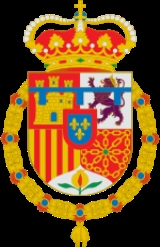
Prince of Asturias
Encyclopedia
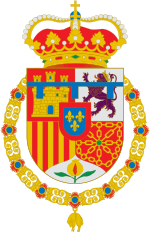
Spanish Constitution of 1978
-Structure of the State:The Constitution recognizes the existence of nationalities and regions . Preliminary Title As a result, Spain is now composed entirely of 17 Autonomous Communities and two autonomous cities with varying degrees of autonomy, to the extent that, even though the Constitution...
, the official) title given to the heir to the Spanish throne. It was also the title under the earlier Kingdom of Castile
Kingdom of Castile
Kingdom of Castile was one of the medieval kingdoms of the Iberian Peninsula. It emerged as a political autonomous entity in the 9th century. It was called County of Castile and was held in vassalage from the Kingdom of León. Its name comes from the host of castles constructed in the region...
. The current Prince of Asturias is Felipe
Felipe, Prince of Asturias
Felipe, Prince of Asturias de Borbón y de Grecia; born 30 January 1968), is the third child and only son of King Juan Carlos and Queen Sofía of Spain....
, son of King Juan Carlos of Spain and Queen Sofía. Contrary to practice in non-Iberian countries, should there be no heir apparent
Heir apparent
An heir apparent or heiress apparent is a person who is first in line of succession and cannot be displaced from inheriting, except by a change in the rules of succession....
, the title can be (but is not necessarily) given to the heir presumptive
Heir Presumptive
An heir presumptive or heiress presumptive is the person provisionally scheduled to inherit a throne, peerage, or other hereditary honour, but whose position can be displaced by the birth of an heir or heiress apparent or of a new heir presumptive with a better claim to the position in question...
- a daughter, sibling or matrilineal descendant of the monarch.
Other associated titles originate from the rest of the kingdoms that formed Spain: Prince of Viana
Prince of Viana
The Prince of Viana is one of the titles of the heir of the Crown of Spain. Other associated titles originate from the rest of the kingdoms that formed Spain: Prince of Asturias, Prince of Girona, Duke of Montblanc, Count of Cervera and Lord of Balaguer....
(for Navarre
Kingdom of Navarre
The Kingdom of Navarre , originally the Kingdom of Pamplona, was a European kingdom which occupied lands on either side of the Pyrenees alongside the Atlantic Ocean....
), Prince of Girona
Prince of Girona
The title of Prince of Girona is one of the titles given to the heir apparent to the Crown of Aragon. It originated in 1351 when King Peter IV of Aragon named his successor, to whom he conceded the title of Duke of Girona; the title embraced territories of the counties of Girona, Besalú, Empúries...
(for Aragon
Kingdom of Aragon
The Kingdom of Aragon was a medieval and early modern kingdom in the Iberian Peninsula, corresponding to the modern-day autonomous community of Aragon, in Spain...
), Duke of Montblanc
Duchy of Montblanc
Duke of Montblanc is a Spanish noble title, which has been reserved as one of the titles of the heir apparent prince since the 15th century, pertaining first to the Aragonese and then to the Spanish crown...
(for Catalonia
Principality of Catalonia
The Principality of Catalonia , is a historic territory in the northeastern Iberian Peninsula, mostly in Spain and with an adjoining portion in southern France....
), Count of Cervera
Count of Cervera
The title Count of Cervera is currently held by Felipe, Prince of Asturias, heir to Juan Carlos of Spain. Cervera is the capital of the comarca of Segarra, in the province of Lleida, Catalonia...
(for Valencia
Kingdom of Valencia
The Kingdom of Valencia , located in the eastern shore of the Iberian Peninsula, was one of the component realms of the Crown of Aragon. When the Crown of Aragon merged by dynastic union with the Crown of Castile to form the Kingdom of Spain, the Kingdom of Valencia became a component realm of the...
) and Lord of Balaguer
Lord of Balaguer
The Lord of Balaguer is a title of the Spanish Crown. specifically represents the Heir to the Kingdom of Mallorca, a part of the Crown of Aragon.-Evolution:...
(for Majorca
Kingdom of Majorca
The Kingdom of Majorca was founded by James I of Aragon, also known as James The Conqueror. After the death of his first-born son Alfonso, a will was written in 1262 which created the kingdom in order to cede it to his son James...
).
Military dictator Francisco Franco
Francisco Franco
Francisco Franco y Bahamonde was a Spanish general, dictator and head of state of Spain from October 1936 , and de facto regent of the nominally restored Kingdom of Spain from 1947 until his death in November, 1975...
appointed Juan Carlos de Borbón
Juan Carlos I of Spain
Juan Carlos I |Italy]]) is the reigning King of Spain.On 22 November 1975, two days after the death of General Francisco Franco, Juan Carlos was designated king according to the law of succession promulgated by Franco. Spain had no monarch for 38 years in 1969 when Franco named Juan Carlos as the...
as his "successor with the title of King" but gave him the new title of Prince of Spain instead of Prince of Asturias.
The current Prince of Asturias has instituted the Prince of Asturias Awards
Prince of Asturias Awards
The Prince of Asturias Awards are a series of annual prizes awarded in Spain by the Prince of Asturias Foundation to individuals, entities or organizations from around the world who make notable achievements in the sciences, humanities, and public affairs....
.
Príncipe de Asturias Peak
Príncipe de Asturias Peak
Príncipe de Asturias Peak is the peak rising to 4680 m in Vinson Massif, Sentinel Range in Ellsworth Mountains, Antarctica, and surmounting Branscomb Glacier to the west-northwest, Roché Glacier to the north and Tulaczyk Glacier to the southwest....
in Vinson Massif
Vinson Massif
Vinson Massif is the highest mountain of Antarctica, lying in the Sentinel Range of the Ellsworth Mountains, which stand above the Ronne Ice Shelf near the base of the Antarctic Peninsula. The massif is located about from the South Pole and is about long and wide. At the highest point is Mount...
, Antarctica is named after the Prince of Asturias.
History
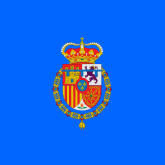
John I of Castile
John I was the king of Crown of Castile, was the son of Henry II and of his wife Juana Manuel of Castile, daughter of Juan Manuel, Prince of Villena, head of a younger branch of the royal house of Castile...
. After two decades of conflicts of varying intensity, the parties arrived at compromise through means of marriage: the future Henry III of Castile
Henry III of Castile
Henry III KG , sometimes known as Henry the Sufferer or Henry the Infirm , was the son of John I and Eleanor of Aragon, and succeeded him as King of the Castilian Crown in 1390....
(1379–1406) was married to Catherine of Lancaster
Catherine of Lancaster
-Coat of arms:The following are Armorials of the House of Lancaster under her father, John of Gaunt.-References:* Anthony Goodman: "Katherine of Lancaster" in Oxford Dictionary of National Biography. Vol. 30 , p. 890-891....
in 1388. A part of the pact ("Accord of Bayonne") was to elevate the young couple to a title, Prince and Princess of Asturias, which was modelled after that of Prince of Wales
Prince of Wales
Prince of Wales is a title traditionally granted to the heir apparent to the reigning monarch of the United Kingdom of Great Britain and Northern Ireland and the 15 other independent Commonwealth realms...
in English kingdom. The title was to belong to the official successor of the Castilian throne. Thus the first Prince and Princess of Asturias were the young Henry of Castile and Catherine of Lancaster.
In the first years the title was not only honorary, as it included the ownership of the territory of Asturias
Asturias
The Principality of Asturias is an autonomous community of the Kingdom of Spain, coextensive with the former Kingdom of Asturias in the Middle Ages...
; the Prince ruled the Principality in representation of the King and was able to appoint judges, mayors, etc. This was changed by the Catholic Monarchs
Catholic Monarchs
The Catholic Monarchs is the collective title used in history for Queen Isabella I of Castile and King Ferdinand II of Aragon. They were both from the House of Trastámara and were second cousins, being both descended from John I of Castile; they were given a papal dispensation to deal with...
, who limited the scope of the title making it merely honorary; this decision was upheld by the members of the House of Habsburg and the House of Bourbon
House of Bourbon
The House of Bourbon is a European royal house, a branch of the Capetian dynasty . Bourbon kings first ruled Navarre and France in the 16th century. By the 18th century, members of the Bourbon dynasty also held thrones in Spain, Naples, Sicily, and Parma...
until the present day.
List
| Image | Name | Heir to | From | Until | |
|---|---|---|---|---|---|
| Year | Cause | ||||
| Henry of Castile Henry III of Castile Henry III KG , sometimes known as Henry the Sufferer or Henry the Infirm , was the son of John I and Eleanor of Aragon, and succeeded him as King of the Castilian Crown in 1390.... (1379-1406) |
John I John I of Castile John I was the king of Crown of Castile, was the son of Henry II and of his wife Juana Manuel of Castile, daughter of Juan Manuel, Prince of Villena, head of a younger branch of the royal house of Castile... (father) |
1388 | 1390 | ascended the throne as Henry III | |
| Maria of Castile Maria of Castile Maria of Castile was Queen consort of Aragon and Naples as the spouse of Alfonso V of Aragon. Maria acted as the regent of Aragon during the reign of her spouse, as he was absent during most of his reign; her regencies lasted between 1420 and 1423 and between 1432 and 1458... (1401-1458) |
Henry III Henry III of Castile Henry III KG , sometimes known as Henry the Sufferer or Henry the Infirm , was the son of John I and Eleanor of Aragon, and succeeded him as King of the Castilian Crown in 1390.... (father) |
1402 | 1405 | displaced by the birth of brother | |
 |
John of Castile John II of Castile John II was King of Castile from 1406 to 1454.He was the son of Henry III of Castile and his wife Catherine of Lancaster, daughter of John of Gaunt, 1st Duke of Lancaster by Constance of Castile, daughter of King Peter of Castile.-Regency:He succeeded his father on 25 December 1406, at the age of... (1405-1454) |
1405 | 1406 | ascended the throne as John II | |
| Catherine of Castile Catherine, Princess of Asturias Catherine of Castile was suo jure Princess of Asturias and heiress presumptive to the Castilian throne all her life.... (1422-1424) |
John II John II of Castile John II was King of Castile from 1406 to 1454.He was the son of Henry III of Castile and his wife Catherine of Lancaster, daughter of John of Gaunt, 1st Duke of Lancaster by Constance of Castile, daughter of King Peter of Castile.-Regency:He succeeded his father on 25 December 1406, at the age of... (father) |
1423 | 1424 | died | |
| Eleanor of Castile Eleanor, Princess of Asturias Eleanor of Castile was heiress presumptive to the throne of the Crown of Castile and Princess of Asturias during her short life.... (1423-1425) |
1424 | 1425 | displaced by the birth of brother | ||
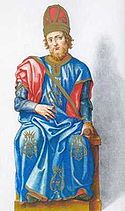 |
Henry of Castile Henry IV of Castile Henry IV , King of the Crown of Castile, nicknamed the Impotent , was the last of the weak late medieval kings of Castile... (1425-1474) |
1425 | 1454 | ascended the throne as Henry IV | |
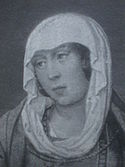 |
Joanna of Castile (1462-1530) |
Henry IV Henry IV of Castile Henry IV , King of the Crown of Castile, nicknamed the Impotent , was the last of the weak late medieval kings of Castile... (father) |
1462 | 1464 | disinherited in favour of half-aunt |
_-_tumba_de_alfonso_de_castilla_-_detalle.jpg) |
Alfonso of Castile (1453-1468) |
Henry IV Henry IV of Castile Henry IV , King of the Crown of Castile, nicknamed the Impotent , was the last of the weak late medieval kings of Castile... (half-brother) |
1465 | 1468 | died |
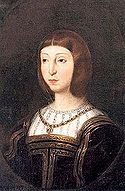 |
Isabella of Castile Isabella I of Castile Isabella I was Queen of Castile and León. She and her husband Ferdinand II of Aragon brought stability to both kingdoms that became the basis for the unification of Spain. Later the two laid the foundations for the political unification of Spain under their grandson, Charles V, Holy Roman Emperor... (1451-1504) |
1468 | 1470 | disinherited in favour of half-niece | |
 |
Joanna of Castile (1462-1530) |
Henry IV Henry IV of Castile Henry IV , King of the Crown of Castile, nicknamed the Impotent , was the last of the weak late medieval kings of Castile... (father) |
1470 | 1475 | crown assumed by Isabella I |
 |
Isabella of Aragon (1470-1498) |
Isabella I Isabella I of Castile Isabella I was Queen of Castile and León. She and her husband Ferdinand II of Aragon brought stability to both kingdoms that became the basis for the unification of Spain. Later the two laid the foundations for the political unification of Spain under their grandson, Charles V, Holy Roman Emperor... (mother) |
1476 | 1480 | displaced by the birth of brother |
 |
John of Aragon (1478-1497) |
1480 | 1497 | died | |
 |
Isabella of Aragon (1470-1498) |
1498 | 1498 | died | |
| Michael of Portugal (1498-1500) |
Isabella I Isabella I of Castile Isabella I was Queen of Castile and León. She and her husband Ferdinand II of Aragon brought stability to both kingdoms that became the basis for the unification of Spain. Later the two laid the foundations for the political unification of Spain under their grandson, Charles V, Holy Roman Emperor... (grandmother) |
1499 | 1500 | died | |
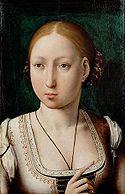 |
Joanna of Aragon Joanna of Castile Joanna , nicknamed Joanna the Mad , was the first queen regnant to reign over both the Crown of Castile and the Crown of Aragon , a union which evolved into modern Spain... (1479-1555) |
Isabella I Isabella I of Castile Isabella I was Queen of Castile and León. She and her husband Ferdinand II of Aragon brought stability to both kingdoms that became the basis for the unification of Spain. Later the two laid the foundations for the political unification of Spain under their grandson, Charles V, Holy Roman Emperor... (mother) |
1502 | 1504 | ascended the throne |
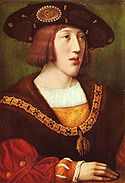 |
Charles of Austria Charles V, Holy Roman Emperor Charles V was ruler of the Holy Roman Empire from 1519 and, as Charles I, of the Spanish Empire from 1516 until his voluntary retirement and abdication in favor of his younger brother Ferdinand I and his son Philip II in 1556.As... (1500-1558) |
Joanna Joanna of Castile Joanna , nicknamed Joanna the Mad , was the first queen regnant to reign over both the Crown of Castile and the Crown of Aragon , a union which evolved into modern Spain... (mother) |
1504 | 1516 | ascended the throne as Charles I |
.jpg) |
Philip of Austria Philip II of Spain Philip II was King of Spain, Portugal, Naples, Sicily, and, while married to Mary I, King of England and Ireland. He was lord of the Seventeen Provinces from 1556 until 1581, holding various titles for the individual territories such as duke or count.... (1527-1598) |
Charles I Charles V, Holy Roman Emperor Charles V was ruler of the Holy Roman Empire from 1519 and, as Charles I, of the Spanish Empire from 1516 until his voluntary retirement and abdication in favor of his younger brother Ferdinand I and his son Philip II in 1556.As... and Joanna Joanna of Castile Joanna , nicknamed Joanna the Mad , was the first queen regnant to reign over both the Crown of Castile and the Crown of Aragon , a union which evolved into modern Spain... (father and grandmother) |
1528 | 1556 | ascended the throne as Philip II |
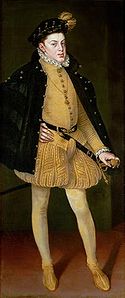 |
Charles of Austria (1545-1568) |
Philip II Philip II of Spain Philip II was King of Spain, Portugal, Naples, Sicily, and, while married to Mary I, King of England and Ireland. He was lord of the Seventeen Provinces from 1556 until 1581, holding various titles for the individual territories such as duke or count.... (father) |
1560 | 1568 | died |
 |
Ferdinand Ferdinand, Prince of Asturias Ferdinand of Spain was the son of Philip II of Spain and Anna of Austria.When Ferdinand was born, he was proclaimed Prince of Asturias, his half-brother Charles having died three years previously. Ferdinand died when he was 6 years old and the new prince of Asturias was his younger brother... (1571-1578) |
1573 | 1578 | died | |
| Diego of Austria Diego, Prince of Asturias Diego Félix of Austria, Infante of Spain was the third son of Philip II of Spain by his fourth wife Anna of Austria.-Life:... (1575-1582) |
1580 | 1582 | died | ||
 |
Philip of Austria Philip III of Spain Philip III , also known as Philip the Pious, was the King of Spain and King of Portugal and the Algarves, where he ruled as Philip II , from 1598 until his death... (1578-1621) |
1584 | 1598 | ascended the throne as Philip III | |
| Philip of Austria Philip IV of Spain Philip IV was King of Spain between 1621 and 1665, sovereign of the Spanish Netherlands, and King of Portugal until 1640... (1605-1665) |
Philip III Philip III of Spain Philip III , also known as Philip the Pious, was the King of Spain and King of Portugal and the Algarves, where he ruled as Philip II , from 1598 until his death... father) |
1608 | 1621 | ascended the throne as Philip IV | |
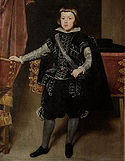 |
Balthasar Charles of Austria (1629-1646) |
Philip IV Philip IV of Spain Philip IV was King of Spain between 1621 and 1665, sovereign of the Spanish Netherlands, and King of Portugal until 1640... |
1632 | 1646 | died |
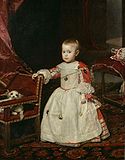 |
Philip Prosper of Austria Philip Prospero, Prince of Asturias Philip Prospero of Spain, Prince of Asturias was the first male child of the marriage between Philip IV of Spain and Mariana of Austria to survive infancy... (1657-1661) |
1658 | 1661 | died | |
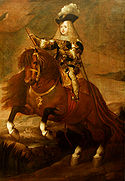 |
Charles of Austria Charles II of Spain Charles II was the last Habsburg King of Spain and the ruler of large parts of Italy, the Spanish territories in the Southern Low Countries, and Spain's overseas Empire, stretching from the Americas to the Spanish East Indies... (1661-1700) |
1661 | 1665 | ascended the throne as Charles II | |
| Louis of Spain (1707-1724) |
Philip V Philip V of Spain Philip V was King of Spain from 15 November 1700 to 15 January 1724, when he abdicated in favor of his son Louis, and from 6 September 1724, when he assumed the throne again upon his son's death, to his death.Before his reign, Philip occupied an exalted place in the royal family of France as a... |
1709 | 1724 | ascended the throne | |
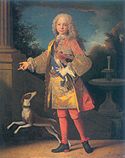 |
Ferdinand of Spain Ferdinand VI of Spain Ferdinand VI , called the Learnt, was King of Spain from 9 July 1746 until his death. He was the fourth son of the previous monarch Philip V and his first wife Maria Luisa of Savoy... (1713-1759) |
1724 | 1746 | ascended the throne as Ferdinand VI | |
| Charles of Spain Charles IV of Spain Charles IV was King of Spain from 14 December 1788 until his abdication on 19 March 1808.-Early life:... (1716-1788) |
Charles III Charles III of Spain Charles III was the King of Spain and the Spanish Indies from 1759 to 1788. He was the eldest son of Philip V of Spain and his second wife, the Princess Elisabeth Farnese... (father) |
1760 | 1788 | ascended the throne as Charles IV | |
| Ferdinand of Spain (1784-1833) |
Charles IV Charles IV of Spain Charles IV was King of Spain from 14 December 1788 until his abdication on 19 March 1808.-Early life:... |
1789 | 1808 | ascended the throne as Ferdinand VII | |
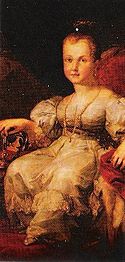 |
Isabella of Spain Isabella II of Spain Isabella II was the only female monarch of Spain in modern times. She came to the throne as an infant, but her succession was disputed by the Carlists, who refused to recognise a female sovereign, leading to the Carlist Wars. After a troubled reign, she was deposed in the Glorious Revolution of... (1830-1904) |
Ferdinand VII (father) |
1830 | 1833 | ascended the throne as Isabella II |
| Isabella of Spain (1851-1931) |
Isabella II Isabella II of Spain Isabella II was the only female monarch of Spain in modern times. She came to the throne as an infant, but her succession was disputed by the Carlists, who refused to recognise a female sovereign, leading to the Carlist Wars. After a troubled reign, she was deposed in the Glorious Revolution of... (mother) |
1851 | 1857 | displaced by the birth of brother | |
| Alfonso of Spain Alfonso XII of Spain Alfonso XII was king of Spain, reigning from 1874 to 1885, after a coup d'état restored the monarchy and ended the ephemeral First Spanish Republic.-Early life and paternity:Alfonso was the son of Queen Isabella II of Spain, and... (1857-1885) |
1857 | 1868 | mother's deposition | ||
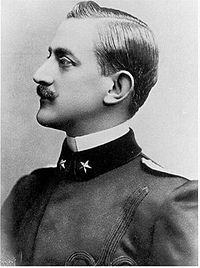 |
Emmanuel Philibert of Savoy (1869-1931) |
Amadeus Amadeo I of Spain Amadeo I was the only King of Spain from the House of Savoy... |
1871 | 1873 | father's abdication |
| Isabella of Spain (1851-1931) |
Alfonso XII Alfonso XII of Spain Alfonso XII was king of Spain, reigning from 1874 to 1885, after a coup d'état restored the monarchy and ended the ephemeral First Spanish Republic.-Early life and paternity:Alfonso was the son of Queen Isabella II of Spain, and... (brother) |
1875 | 1880 | displaced by the birth of niece | |
| Mercedes of Spain Mercedes, Princess of Asturias Infanta María de las Mercedes of Spain , Princess of the Asturias, for all 24 years of her life the heiress presumptive to the Crown of Spain, was the eldest daughter of King Alfonso XII of Spain and his second wife, Maria Christina of Austria.For a period from... (1880-1904) |
Alfonso XII Alfonso XII of Spain Alfonso XII was king of Spain, reigning from 1874 to 1885, after a coup d'état restored the monarchy and ended the ephemeral First Spanish Republic.-Early life and paternity:Alfonso was the son of Queen Isabella II of Spain, and... (father) Alfonso XIII Alfonso XIII of Spain Alfonso XIII was King of Spain from 1886 until 1931. His mother, Maria Christina of Austria, was appointed regent during his minority... (brother) |
1881 | 1904 | died | |
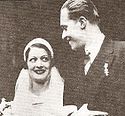 |
Alfonso of Spain (1907-1938) |
Alfonso XIII Alfonso XIII of Spain Alfonso XIII was King of Spain from 1886 until 1931. His mother, Maria Christina of Austria, was appointed regent during his minority... (father) |
1907 | 1933 | renounced his succcession rights |
| Juan, Count of Barcelona (1913-1993) |
Alfonso XIII Alfonso XIII of Spain Alfonso XIII was King of Spain from 1886 until 1931. His mother, Maria Christina of Austria, was appointed regent during his minority... (father) |
1933 | 1977 | Recognized as heir apparent to the Spanish throne and held the title Prince of Asturias from 21 June 1933, but preferred to use the title Count of Barcelona; renounced his claim to the throne in favour of his son, Juan Carlos on 14 May 1977 | |
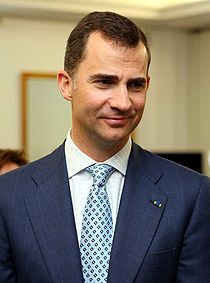 |
Felipe of Spain Felipe, Prince of Asturias Felipe, Prince of Asturias de Borbón y de Grecia; born 30 January 1968), is the third child and only son of King Juan Carlos and Queen Sofía of Spain.... (1968-) |
Juan Carlos I Juan Carlos I of Spain Juan Carlos I |Italy]]) is the reigning King of Spain.On 22 November 1975, two days after the death of General Francisco Franco, Juan Carlos was designated king according to the law of succession promulgated by Franco. Spain had no monarch for 38 years in 1969 when Franco named Juan Carlos as the... |
1977 | incumbent | — |
See also
- AsturiasAsturiasThe Principality of Asturias is an autonomous community of the Kingdom of Spain, coextensive with the former Kingdom of Asturias in the Middle Ages...
- Asturias, CebuAsturias, CebuAsturias is a 1st class municipality in the northwestern coast of Cebu Province, Philippines. According to the 2007 census, it has a population of 40,939 people.It is geographically located at 10°34'N 123°43'E...
, Philippines - Princess of AsturiasPrincess of AsturiasThis is a list of women who held the title Princess of Asturias by marriage.The title was created in 1388 for the future Henry III of Castile and Catherine of Lancaster. A part of the pact was to gran the young couple the title of Prince and Princess of Asturias, which was modelled after that of...
- Spanish monarchySpanish monarchyThe Monarchy of Spain, constitutionally referred to as The Crown and commonly referred to as the Spanish monarchy or Hispanic Monarchy, is a constitutional institution and an historic office of Spain...
- Prince of Asturias AwardsPrince of Asturias AwardsThe Prince of Asturias Awards are a series of annual prizes awarded in Spain by the Prince of Asturias Foundation to individuals, entities or organizations from around the world who make notable achievements in the sciences, humanities, and public affairs....
- Spanish aircraft carrier Principe de AsturiasSpanish aircraft carrier Principe de AsturiasThe Príncipe de Asturias , originally named Almirante Carrero Blanco, is an aircraft carrier, the flagship of the Spanish Navy...
- List of titles and honours of the Heir Apparent to the Spanish Throne

